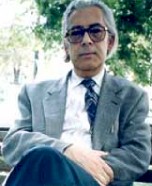Casimiro de Brito
Born in Algarve, Portugal, 1938. His cultural activity began
in 1953 and includes contributions to newspapers, poetry readings,
poetic works, fiction, essays, diaries and translations. His
activity has also involved countless lectures and colloquia at
schools, factories, cultural associations and universities at
home and abroad, included rather frequent attendance at conferences
and poetry festivals all around the world. He has edited several
literary magazines: Cadernos do Meio-Dia (1956-1959), Outubro/Fevereiro/Novembro (1970-1972), Loreto 13 (organ
of the Portuguese Writers's Association), Columba (Portuguese
and Brasilian magazine of poetry).
He is president of the Portuguese P.E.N. and director of three
poetry festivals: in Lisbon, at Porto Santo (Madeira) and at
Faro (Algarve). He was President of the Association Européenne
pour la Diffusion de la Poésie. He is advisor of the World
Haiku Association. He is the author of 39 titles of poetry, fiction,
aphorisms and essays and his works have been included in more
than one hundred anthologies and translated into 19 languages.
Several prizes for his work, including some international prizes,
the last of them (2002) the first "Poetry International
Prize Leopold Sedar Senghor"
MAIN POETIC WORKS
Labyrinthus, 1980, Portuguese Writers Association Award;
Ode & Ceia, 1985 (includes his production from 1955
to 1984; Versilia/Itália award for the best book of "Collected
poems"); Ni Maître ni Serviteur, 1986; Subitamente
o Silêncio, 1991; Intensidades, 1995; Opus
Affettuoso, 1997 (P.E.N. Poetry Award); Pouco de Pouco,
1999 and the selected poems O Amor, a Morte e Outros Vícios,
1999; Na Via do Mestre, an answer to the Tao te-King,
2000; Arte Pobre (collecting a few books), À
sombra de Bashô (a renku with Matsuo Bashô),
2000; the book of aphorisms, Da Frágil Sabedoria,
2000; Na Barca do Coração, his diary of
the year 2000 ; Animal Volátil, 2002.
|

|